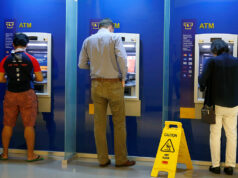China unlikely to follow Fed hike
CHINA’S central bank is expected to keep borrowing costs on hold through the end of this year despite further Federal Reserve rate hikes from this week, as economic growth slows and the trade war with the US gets worse.
The interest rate on People’s Bank of China (PBoC) seven-day reverse-repurchase agreements will stay at the current level of 2.55% through the end of the year, according to the median estimate in a Bloomberg survey of more than 40 traders and analysts conducted from Sept. 18-20.
Fed policy makers are widely expected to authorize a quarter-point hike in their benchmark overnight interest rate in Washington on Wednesday and signal they are on track to complete another increase before the end of the year.
“There is no need to follow,” said Meng Xiangjuan, chief bond analyst at SWS Research Co. in Shanghai, adding that the stabilizing yuan-dollar exchange rate also reduces the pressure on the PBoC.
The escalating trade war with the US and slowing economic growth are weighing on monetary policy decisions. China’s government is cutting some taxes, boosting spending, and loosening the monetary stance to ensure ample market liquidity.
“The trade uncertainty has prompted the central bank to maintain an accommodative bias,” Raymond Yeung, chief greater China economist for Australia & New Zealand Banking Group Ltd. in Hong Kong, said in the survey, adding that the central bank will likely stay put as it did in June after the Fed raised rates.
Zhu Jianfang, chief economist at Citic Securities Co., also said in a research note that China is not likely to keep up with the Fed in the fourth quarter, citing the downward pressure on the real economy.
About 90% of the survey respondents said the central bank will inject more liquidity into the market in the fourth quarter. The medium-term lending facility tool is seen as being the most likely method for over 87% of respondents, with injections via a lowering of the reserve requirement ratio or open market operations also seen as possible for over 70%.
The PBoC will “try and maintain sufficient liquidity in the system,” Jeremy Stevens, a Beijing-based economist at Standard Bank Group Ltd. said in response to the survey. The measures won’t translate into effective lending in the short term, but “that is better for the longer term outlook for the Chinese economy,” he added. — Bloomberg



